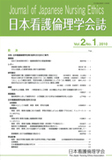Japanese
English
- 販売していません
- Abstract 文献概要
- 参考文献 Reference
- サイト内被引用 Cited by
実践と教育・研究は、看護教育と看護専門職、および看護が奉仕する社会にとって不可欠である。講演では、「公共の利益」「責任」「信頼」という倫理的概念について考えながら、臨床・実践と教育・研究とが協働しあうことの倫理を述べる: 1)日本の看護教育の変遷と、教育に関係する人々、すなわち学生、看護実践者、実習指導教員、および講義を行う教員の役割、2)「専門職としての社会化」という文脈の中で、学生がよい看護師として育っていくことを助ける要因、3)実践と教育・研究との協働を困難にすると考えられる側面とその倫理、および、4)個々の看護師が尊敬と信頼をベースとした同僚関係をもち、看護におけるさらなる協働を深めるための道しるべとしての、倫理原則と徳の倫理のアプローチ。私の講演を貫いているのは、よいことをなすために本当に純粋になるまで待つ必要はない、という仏陀の教えである。人が純粋になることは一生にわたる旅路であり、完全なる純粋さは到達しえないものなのかも知れない。よいことは行ないながら求め続けるのだ。
This presentation explores the ethical concepts of the public good, responsibility and trust to examine the ethics of collaboration between academic nursing and clinical nursing both of which are vital to nursing education, to the nursing profession and to the public which nursing serves. Changes in Japanese nursing education and the professional roles of those involved in this education are examined along with some historical highlights. The factors that assist students to become a good nurse are detailed within the context of the professional socialization process. Potential areas of difficulty in collaboration are outlined from an ethical perspective and a beginning guideline of ethical principles and virtues are summarized to assist individual nurses strengthen their colleagueship and collaboration in nursing. All of these comments are grounded in an idea from Buddha: We do not have to wait until we are pure at heart to do good. Becoming pure at heart is a life long journey which we may never fully attain.
Copyright © 2010, The Japan Nursing Ethics Associatin. All rights reserved.


